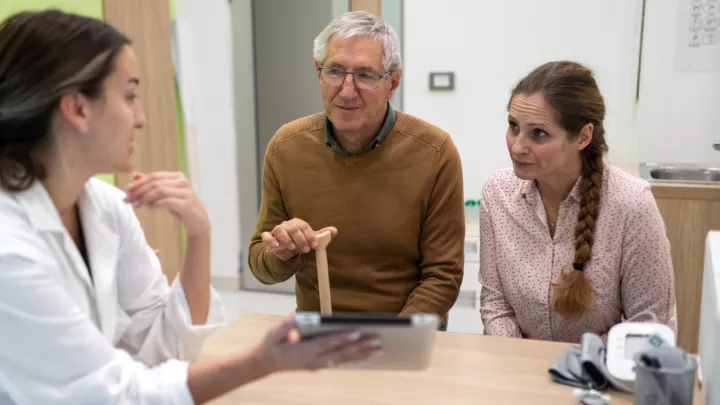A patient's empowering experience with genetic screening

In March 2024, Gina Marchio embarked on an insightful journey through genetic screening.
Participating in the Nebraska Medicine Genetic Insights Project, a large-scale community research study, Marchio hoped to learn what her DNA could tell her about her future health.
“I read about it at work and said, ‘I want to do genetic testing,’” says Marchio, a Nebraska Medicine payment app senior associate. “I just wanted to see if there was anything that I should be concerned about and go from there.”
The process involved a blood draw in March, and by April, she had her results.
A valuable finding
The results showed Marchio had Lynch syndrome, a genetic condition associated with an increased risk of several types of cancer, including colon and endometrial cancer.
The emotional weight of the diagnosis was significant. Marchio says, “I realized there’s a lot to this, and I’ve got to learn about it and be proactive.”
Jessie Poskochil, a Nebraska Medicine genetic counselor who works with many Genetic Insights Project patients, helped Marchio understand her results.
“Some of the implications we always talk about include how this test result will impact the patient themselves, such as their plan for future screenings,” Poskochil says. “And then, secondly, how does it impact their family? What is the inheritance pattern, and who else gets tested?”
During their session, as she does with all patients, Poskochil used visual aids to help explain the information. This personalized approach ensured that Marchio left the session with a clearer understanding of her genetic makeup and its implications.
After consulting with Poskochil, Marchio advised her family members to undergo genetic testing. Two of them found they also have Lynch syndrome, and all three are taking charge of their health to minimize risks.
Addressing common misconceptions
Poskochil says that, when undergoing genetic screening, people often assume a positive genetic test result guarantees the development of cancer.
“It’s important to know that genetic testing isn’t a crystal ball,” she says. “It can tell us if you have an increased lifetime risk of developing a type of cancer, but it won’t tell us if you will develop it or when you will develop it.”
Genetic screening can also raise concerns about cost. Because Marchio was participating in the Genetic Insights Project, there was no cost for her test or her follow-up consultation with the genetic counselor.
However, many people are unaware that genetic testing is usually affordable and may be covered by health insurance, Poskochil says.
“The cost has dramatically come down in the past few years, and even if insurance doesn’t cover the cost, the out-of-pocket price for a hereditary cancer gene panel test is usually around $250,” Poskochil says.
Privacy can be another concern. Poskochil explains that individuals who undergo genetic testing are protected under the Genetic Information Nondiscrimination Act, or GINA.
“It protects individuals in most scenarios from having their genetic testing results be used against them for health insurance or employment discrimination,” she says.
Poskochil notes, however, that GINA does not apply to life, disability or long-term care insurance.
A new perspective
After receiving her results, Marchio scheduled an appointment with a specialist at the Nebraska Medicine Cancer Risk and Prevention Clinic. While waiting for the appointment, she has begun making small lifestyle changes, like monitoring her diet, to mitigate potential risks.
Though initially surprising, Marchio says her experience with genetic screening has been empowering.
“It gave me a different view on how important your health is, how it can change, and really listening to your body,” she says. “Knowledge is powerful, and this is helping me be more preventive.”







